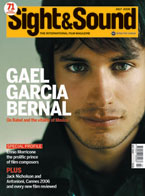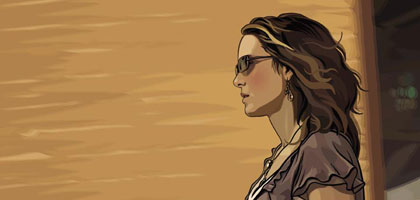Primary navigation


Amy Taubin surveys the young Americans
"It's about how a bunch of teenagers are dying because we don't have an alternative fuel source," said Richard Kelly of 'Southland Tales', his hallucinatory, media-saturated, apocalyptic, broken-hearted, future/present follow-up to 'Donnie Darko' - which has just a ghost of a chance of being shown theatrically in its two-hour 43-minute Cannes version. As oneiric and overwhelming as two memorial films of Cannes past - David Lynch's 'Mulholland Dr.' and Wong Kar-Wai's '2046' - and a lot funnier, 'Southland Tales' attributes the war in Iraq and the devastation of the planet to the greed and increasing desperation of Big Oil and to the all-encompassing (at least in the US) media culture, of which the film is unabashedly a part. Kelly's mash-up owes as much to 'It's a Mad Mad Mad Mad World' as to 'Kiss Me Deadly' and the aforementioned Lynch Hollywood dystopia, as well as recalling two American underground film-makers - Ken Jacobs and Manuel De Landa - whose work Kelly has probably never seen. Most visionary in its refusal of self-contained narrative form, it embeds the entwined trajectories of three characters (played by stars Dwayne 'The Rock' Johnson, Seann William Scott and Sarah Michelle Gellar) in a web of music videos, car commercials, inane talk shows and 'SNL' skits, and truncates the whole chaotic mess with a big bang that spells the end of the world as we know it. Or does it?
On a smaller scale, Richard Linklater's 'Fast Food Nation', a fictionalised adaptation of Eric Schlosser's bestselling exposé, goes beyond the single-issue identity politics that has dominated American independent films for the past two decades to make connections between the food industry, exploitation of labour, immigration and the destruction of the eco-system. Less overtly provocative but even more disturbing, the same director's 'A Scanner Darkly', an animated version of Philip K. Dick's 1977 novel about the kind of mind-destroying drugs, corporate control and government surveillance that never go out of style, finds an exquisite correlative for Dick's paranoid nightmare in a digitally rotoscoped animation technique that oscillates between near-realistic and graphic-novel imagery.
Comic relief was supplied by John Cameron Mitchell's 'Shortbus', best described by the film-maker himself as "a soft-hearted, hard-core movie", and Kevin Smith's 'Clerks II', both playing in midnight out-of-competition slots. Mitchell made even more subversive and memorable use of the 'Star Spangled Banner' than Kelly, and like Kelly earnestly described himself as "a patriotic American" during his press conference. 'Clerks II', which received an astonishing eight-minute standing ovation (the French seem to regard Smith as the second coming of Jerry Lewis), is a return to form and to the scene and characters of the director's no-budget New Jersey working-class debut. What makes both 'Shortbus' and 'Clerks II' so endearing is that in a time of diminished expectations, not to mention outright horror, they look to friendship, loyalty, sexual pleasure and really filthy jokes as a way to get through the night.